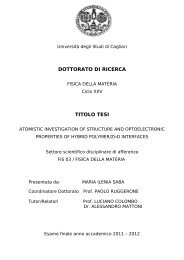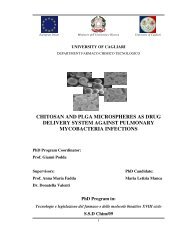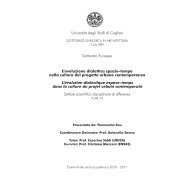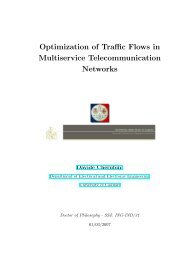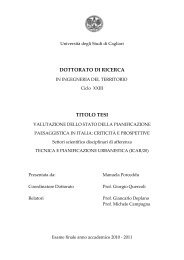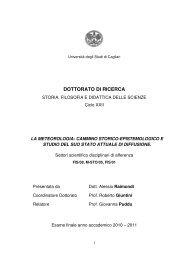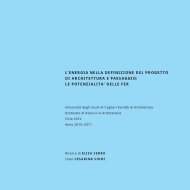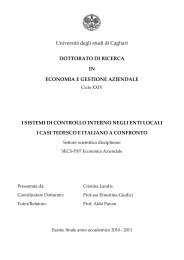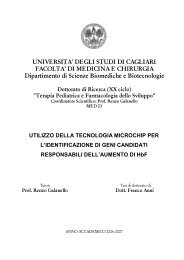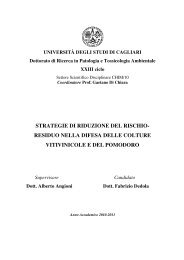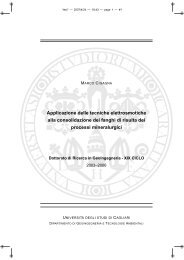The only truly alien planet is Earth. - UniCA Eprints - Università degli ...
The only truly alien planet is Earth. - UniCA Eprints - Università degli ...
The only truly alien planet is Earth. - UniCA Eprints - Università degli ...
You also want an ePaper? Increase the reach of your titles
YUMPU automatically turns print PDFs into web optimized ePapers that Google loves.
significa tanto raggiungere il d<strong>is</strong>velamento di una conoscenza dal potenziale di redenzione, quanto<br />
scoprire le modalità attraverso le quali prende corpo la psicopatologia indotta dalla società 506 .<br />
L’incidente sembra essere un espediente escogitato dalla parte inconscia della personalità di<br />
Maitland come via di fuga da una serie di problemi non percepiti dalla sua parte cosciente. Via via<br />
che il tempo passa la sua intenzione di lasciare l’<strong>is</strong>ola diviene sempre meno ferma, e addirittura<br />
fin<strong>is</strong>ce per considerarla la sua residenza. In quest’atteggiamento si coglie un’eco dei sentimenti<br />
contrastanti v<strong>is</strong>suti da Ballard nel campo di prigionia per civili in cui fu internato durante la guerra:<br />
«[…] h<strong>is</strong> “entire world had been shaped by the camp” and […] instead of “wanting to escape from<br />
it” he had sought “to burrow ever more deeply into its heart” ([<strong>The</strong> Kindness of Women] p. 48)<br />
[…]» 507 .<br />
La condizione a cui perviene il protagon<strong>is</strong>ta una volta accettata la realtà in cui si ritrova, la<br />
sua identificazione con il nuovo ambiente è riassunta efficacemente in questa sua affermazione: «I<br />
am the Island” 508 . Maitland, Robinson e Pincher Martin giungono gradualmente ad essere, ciascuno<br />
a suo modo e non senza difficoltà, il sovrano della propria <strong>is</strong>ola, con la quale si identificano. Ma<br />
mentre Martin dovrà affrontare i suoi fantasmi in solitudine, per gli altri due il primo problema,<br />
oltre alla pura e semplice sopravvivenza, è quello del rapporto con gli altri esseri umani. Se<br />
Robinson deve proteggersi dalle incursioni delle tribù di cannibali che di tanto in tanto approdano<br />
sull’<strong>is</strong>ola, Maitland si trova a dover affrontare personaggi come Proctor e Jane. Nella lettura di<br />
Stephenson i tre rivestono un doppio ruolo in quella che può essere considerata una r<strong>is</strong>crittura di<br />
<strong>The</strong> Tempest (1611) di William Shakespeare. Il primo sarebbe sia Calibano che Ariel, la seconda sia<br />
Miranda che la strega Sicorace, mentre Maitland sarebbe sia Antonio che Prospero. Quest’ultimo<br />
rappresenta la mente inconscia che ha provocato l’incidente, Antonio la mente cosciente. In Jane i<br />
due poli rappresentano r<strong>is</strong>pettivamente l’atteggiamento protettivo e accogliente nei confronti di<br />
Maitland e quello aggressivo e mal d<strong>is</strong>posto. Anche in Proctor le due figure rappresentano la stessa<br />
oscillazione tra ostilità e benevolenza. Inoltre, Proctor è una sorta di doppio oscuro di Maitland, un<br />
Venerdì sui gener<strong>is</strong>, con il quale intrattiene un rapporto quasi alla Jekyll-Hyde 509 .<br />
506 «<strong>The</strong> encounter between the individual and the environment may strip the self of socially programmed assumptions<br />
but th<strong>is</strong> does not mean that psychic bedrock will necessarily be reached; what may be revealed <strong>is</strong> not a tragic knowledge<br />
– such as Kurtz’s “the horror! <strong>The</strong> horror!” – that <strong>is</strong> potentially redemptive but rather the ruses by which socially<br />
induced psycho-pathologies cover their tracks.» A. Gasiorek, op. cit., pp. 114-115.<br />
507 Ivi, p. 149.<br />
508 J. G. Ballard, Concrete Island, London, Triad/Paladin, 1992, p. 52.<br />
509 «It <strong>is</strong> Proctor with whom Maitland has the deepest psychic affinity, the two sharing clothes, a wr<strong>is</strong>twatch, a name,<br />
and ultimately a tomb. Although ostensibly it <strong>is</strong> Maitland who masters Proctor, it <strong>is</strong> the latter who exerts the real power:<br />
introducing Maitland to a “new time setting” ([Concrete Island], p. 86), awakening him to the life of the unconscious.<br />
[…] Proctor personifies the deepest instincts and impulses of the psyche: anger and love, the urge for oblivion and the<br />
urge for transcendence, all the aspects of the unconscious self that Maitland has neglected and suppressed in the past. In<br />
- 153 -



